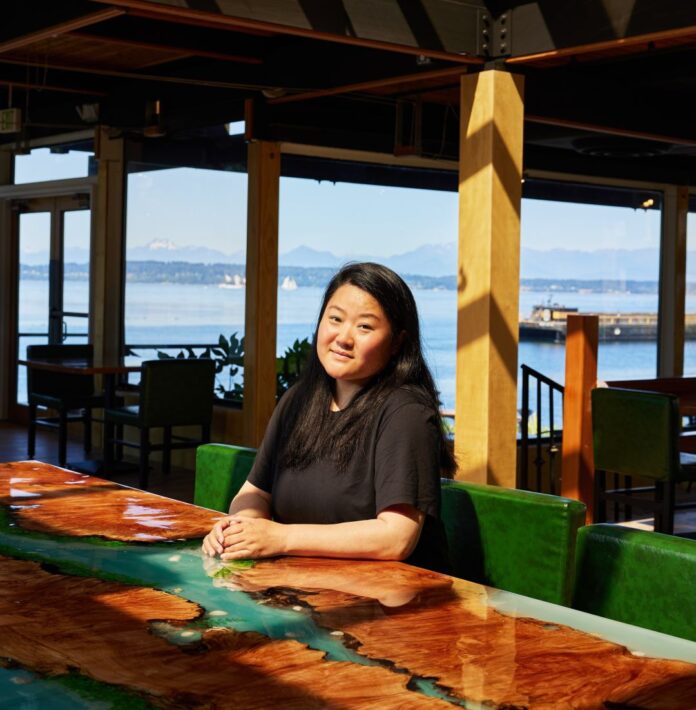This post was originally published on this site
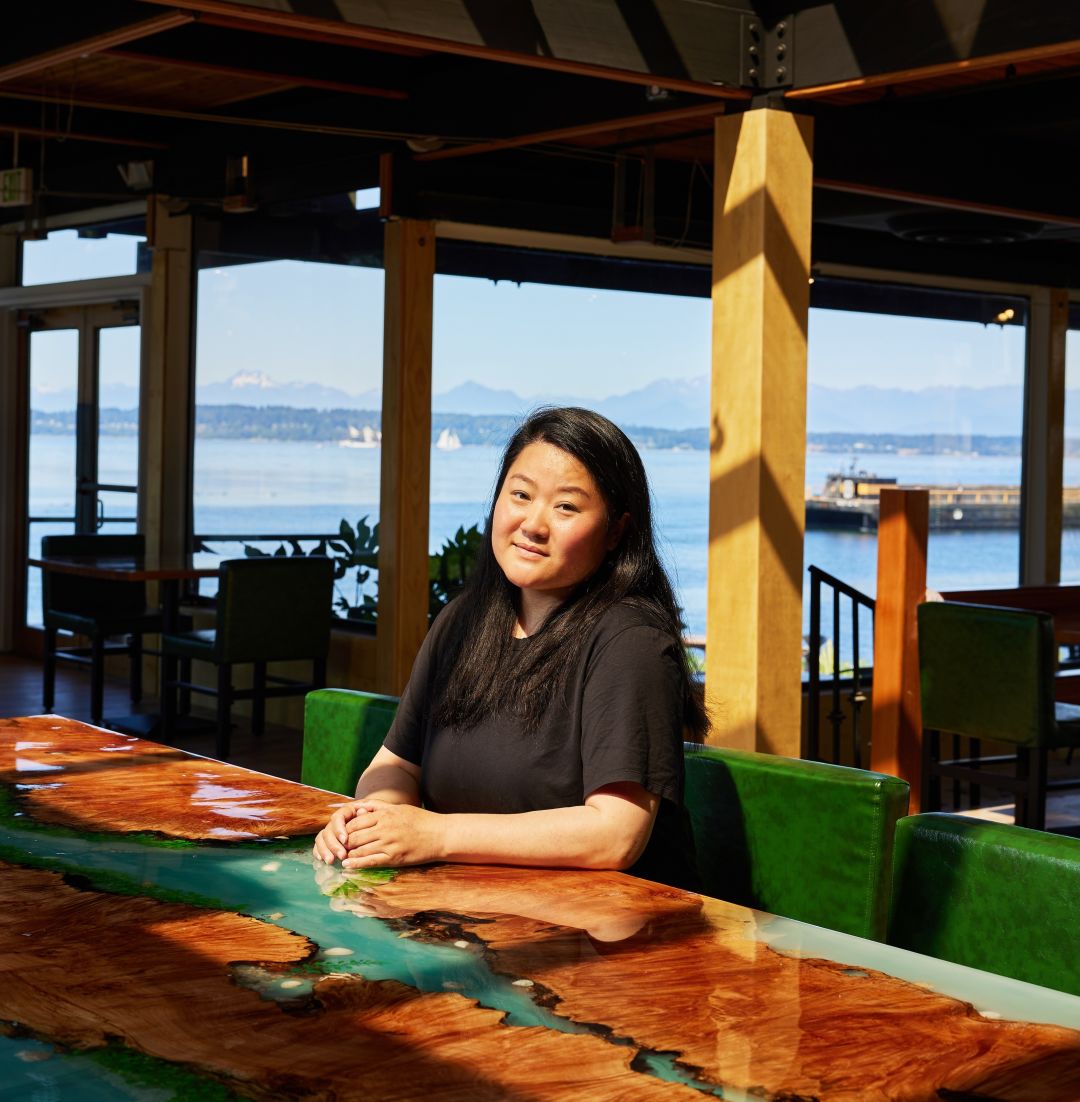
Lily Wu will make all her own dreams come true when she opens Happy Crab on Shilshole.
When Seattle Met named Xi’an Noodles one of the best new restaurants of the year in 2016, we noted that the restaurant offered little in the way of ambience. When owner Lily Wu’s opens her latest endeavor—slated for later this month—there is little chance of anyone making such a remark.
At 42, dressed in a suit and standing in the yet-unfurnished main room of what might be the city’s most ambitious restaurant opening this year, even this decade, Wu points toward an alcove facing Ballard’s Shilshole Bay. “The window and the water right in front of us, the white piano right here. That’s like a dream scene, like, in a movie.”
The 13,000-square-foot Happy Crab holds 250 seats, plus another 50 overlooking the beach outside—three times as many as Wu’s next biggest restaurant. It’s the size of restaurants opened by big groups with deep pockets, layers of experience, and sales teams ready to hawk event spaces. It’s not the kind of place usually opened by someone whose main experience is a neighborhood noodle house. It is a daring move, especially at a time of economic uncertainty and labor shortage. Happy Crab on Shilshole is as far from her first restaurant, a stall inside a U District Korean market, as Seattle is from her rural home province in northeastern China.
“I came from nothing. I have nothing to lose. That’s my major power,” says Wu, the second of four children born to farmers in the Jilin province—which borders North Korea and Russia, near Vladivostok. “I come from a village, on a muddy paddy road.”
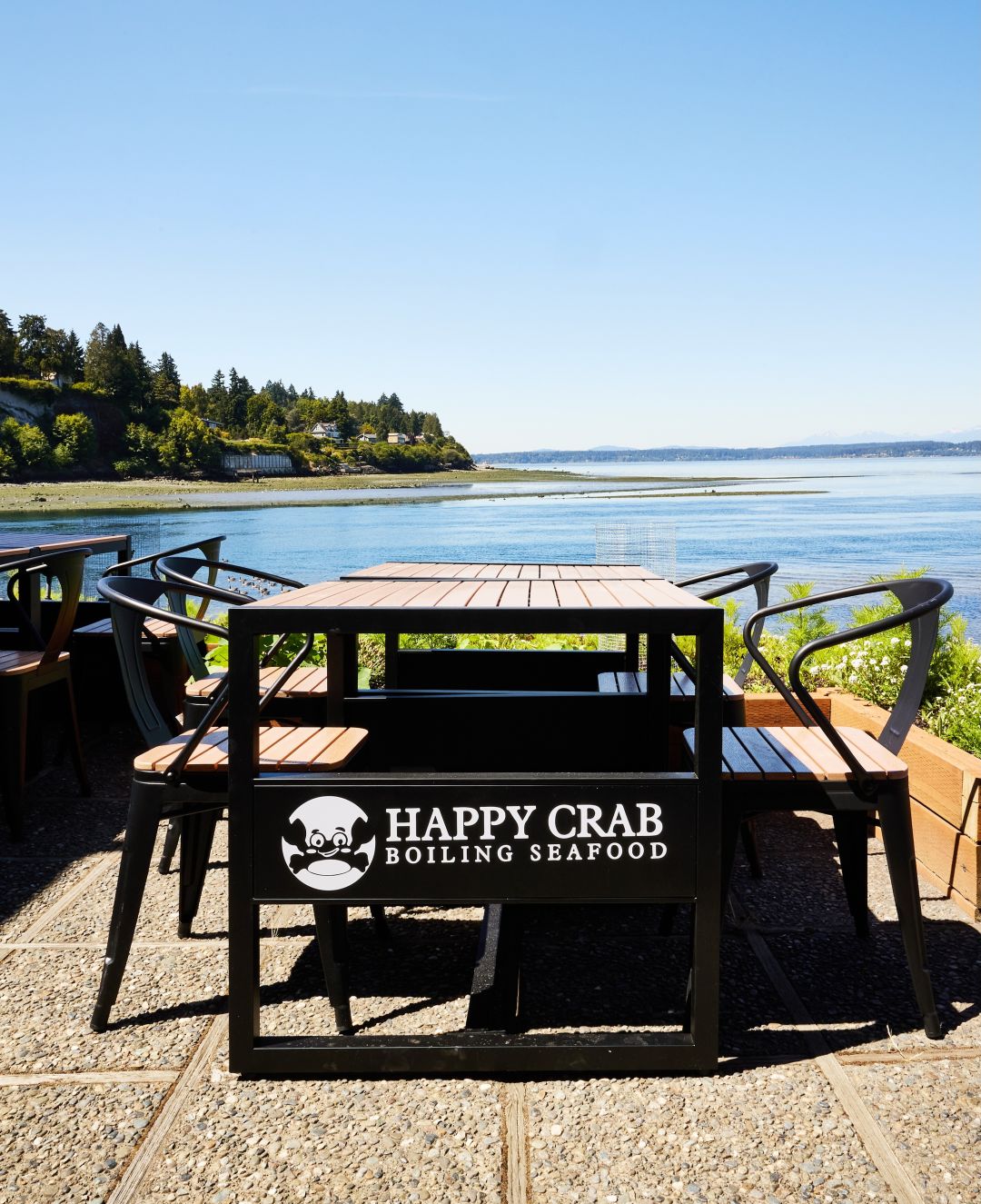
The beachfront patio is a big part of what drew Wu to the former Anthony’s location.
When she first went to the American embassy to get a visa to attend school in the US, Wu noticed other kids brought letters from the bank showing that they had the money to afford their schooling; she brought a photo of her parents’ land, “The cow, the sheep, and the pig.”
She arrived in New York in 2006, but soon cut her studies short. “I met a man, I married him,” she says. The immigrant couple struggled to make ends meet, especially after their son was born. In 2009, Wu made a decision that, she once wrote, “Broke me in ways I’ll never fully describe.” She sent her 1-year-old away to live with her parents in China.
Wu and her husband moved to Seattle, hoping for a more affordable living situation. She worked two jobs, housekeeping in hotels for 15 hours a day, until she could save up enough to bring her son back and make a life as a family. It took nearly three years.
A Need for Noodles
Once reunited with her son, Wu could begin to think about other things she missed—specifically liang pi, a spicy cold noodle dish from Xi’an province, a place 1,000 miles from where she grew up, but popular all across China. She started to muse on selling it here in Seattle—to satisfy her cravings for a taste of home and a path out of her difficult jobs.
Wu and her husband opened a tiny counter inside Woori Market on the Ave in 2014, but a year later the store closed, and with it, the noodle stand. Wu went back to doing double duty at hotels, but only until she found her next opportunity. In March of 2016, she opened the first Xi’an Noodles, just up the Ave from the old stand.
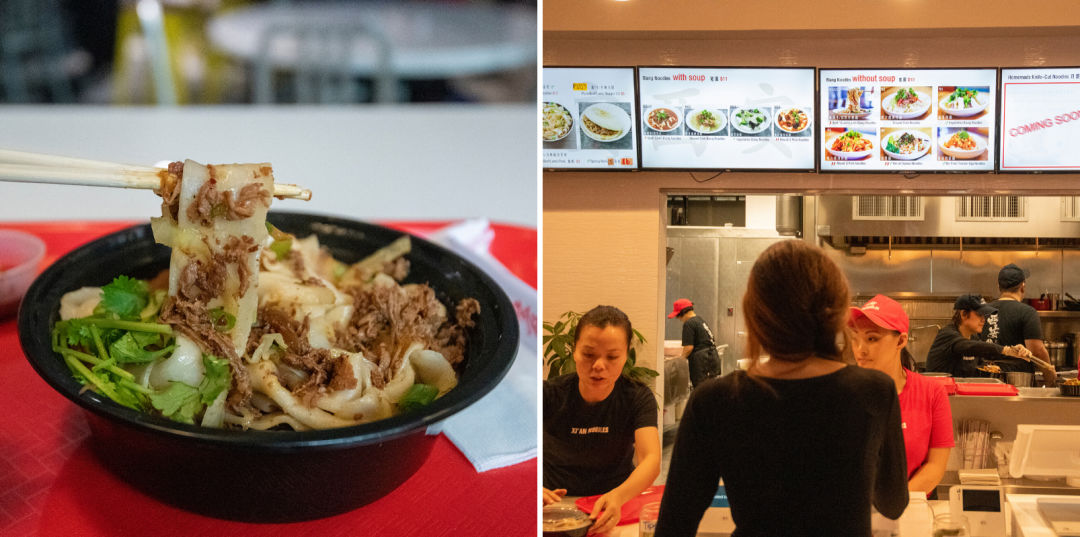
Wu’s empire started with spicy cumin lamb noodles; the Westlake Center location of Xi’an Noodles opened in September 2019.
Wu was not the only one in town craving the foods of Western China; the restaurant served its theatrically made biang biang noodles dressed in spicy oil to packed tables of students and pepper-coated lamb salad to crowds of food lovers. Relishing her success, Wu jumped on the opportunity when Westlake Center invited her to open a second location there in 2019. It opened that September. A few months later, the pandemic hit.
“My husband blamed me,” says Wu. They owed their landlords a lot of money, and he chalked their double debt up to her aspirations and insistence on opening the second location. It was a sign of a bigger split in their relationship: He was 55, she was 37. He wanted stability and comfort; she was just realizing her own strength and ready to do more. “Life is about a journey, right? You need to do what you want,” says Wu. They got divorced shortly after.
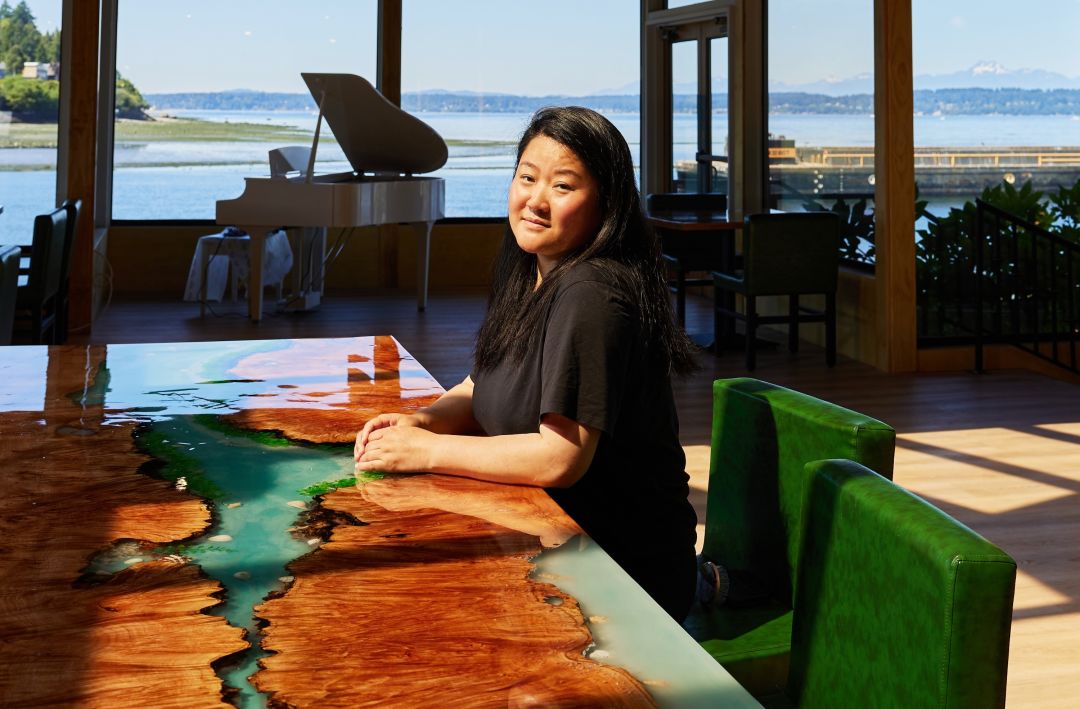
The white piano in Happy Crab’s dining room is a symbol of Wu’s dreams coming true.
Big Dreams, Bold Moves
Free to do as she pleased, Wu renovated the original location, then, in 2022, opened a third location in Bellevue. Two years later, she opened the first Happy Crab in Auburn, a 100-seat Cajun seafood boil restaurant.
In 2023, she went to a networking event at Anthony’s Pier 66. It was her first time in a waterfront restaurant, and she was astonished and amazed by the view. “Something came to my mind: What if I own one in the future?” she mused. “I planted seeds, that time, in my mind.”
Not long after, she saw the former Anthony’s space on Shilshole available on a real estate website. Despite its “Genuinely breathtaking location on a rocky promontory over the bay,” wrote Kathryn Robinson in Seattle Met when the restaurant closed in 2016, cloned chains were getting replaced by more sophisticated, cheffier spots. “Places like Anthony’s simply stopped being what Seattle was hungry for.” The space sat empty for nearly a decade—the entire lifespan of Xi’an Noodles. Wu decided to give it a try.
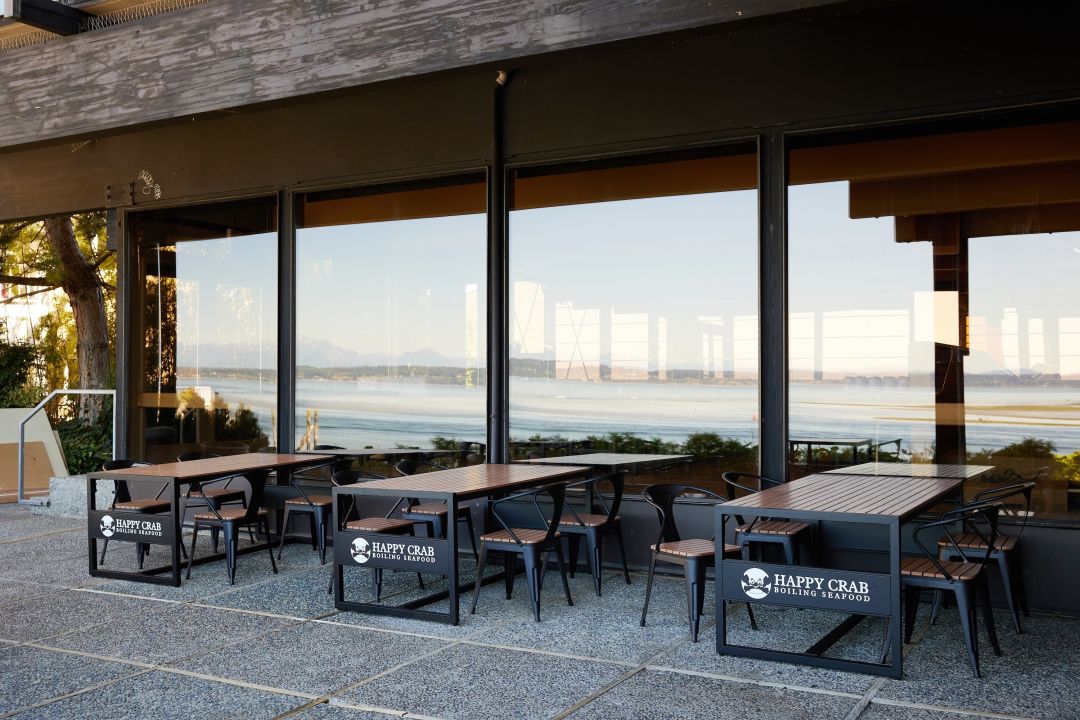
The 50-seat patio facing Shilshole Bay gives diners some of the best views in town.
“Even when I started to negotiate the lease, I didn’t think landlord was going to lease such a big space to me, a small restaurant owner,” she says. “My business was just a noodle shop.” But then it happened. She couldn’t believe it was actually happening. Sometimes she still can’t. But the day after she signed the lease, she got to work.
The menu at Happy Crab brings together everything Wu has done before, and expands on it. The menu of seafood boils from the Auburn location serves smartly as the anchor—a staple of waterfront restaurants that matches the saltwater breezes drifting across the patio. A second segment of the menu expands on the Chinese noodles on which she built her restaurant empire, weaving shellfish into her hand-ripped noodles and delicate xiao long bao. A third section, a concession to the realities of the size and location, perhaps, includes classic American dishes—burgers and such. Brad Inserra, longtime chef and owner of the now-closed Brad’s Swingside Cafe in Fremont, shaped that menu as the executive chef in charge of research and development. Wu also brought on consultants and a second executive chef to take charge of operations.
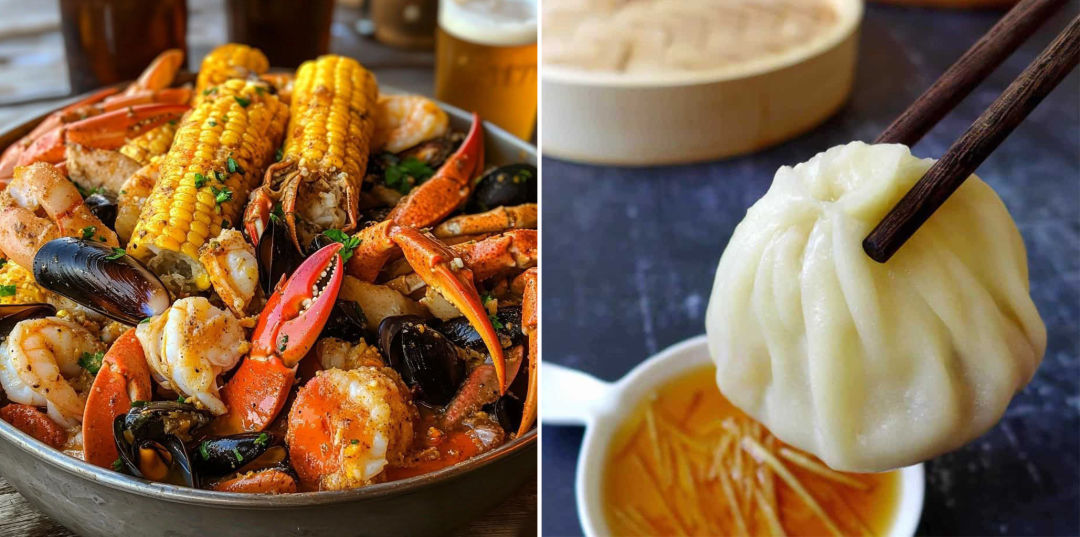
The menu caters to the waterfront location with seafood boils and Wu’s background with dumplings and noodles.
There is a bar, a patio, an events space, and that white piano, overlooking the bay, a symbol of Wu’s accomplishments. As a child, Wu loved music but lessons—like learning to play piano—were never in the cards. Now, she hopes to take lessons so that she might someday play that gleaming instrument in Happy Crab. She also plans to pick back up the classes she started prior to the pandemic to improve her English, all while opening a 300-seat restaurant and running her current businesses. “If I don’t do those things, why did I leave my small village?” she asks. “I choose to step out.”












